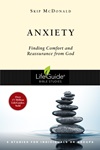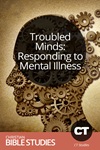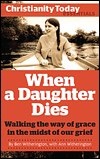Our culture simply doesn't know what to think about death. Through medicine and science we know more about death and how to forestall it than ever before. Yet we know very little about caring for a dying person. We don't know what to expect or how to prepare for our own death. And we're often awkward at best when trying to comfort a friend in grief.
Our culture is fighting, and sometimes succeeding, to expand the so-called right to die. We hear stories of the compassion of family members and doctors who assist in the deaths of terminally ill patients. Yet our doctors and hospitals are astounding in their ability and passionate desire to rescue cancer sufferers, accident victims, or heart-attack patients. We have come to expect medical breakthroughs, vaccines, and wonder-working drugs.
There is no shortage of books, studies, and experts ready to explain our culture's fear of death or our eagerness to avoid it. Yet some of our bestsellers—Tuesdays with Morrie, The Last Lecture, 90 Minutes in Heaven—feature stories about people dying, or nearly so, and the lessons they discovered at the end of life. Celebrities give a whole society the opportunity to follow along in the struggle with a terminal disease and publicly, at least on TV, mourn their deaths.
Having volunteered with hospice patients and worked with grieving families at a funeral home, I've seen the results of this confusion firsthand. Interviewing families, doctors, and hospice workers, it's clear that our paradoxical approach to death is largely due to the fact that we are strangers to death—despite it being ever present. Caring for elderly parents is typically our first prolonged and engaged confrontation with death. Even then, however, doctors and nurses often guide us through the experience. It's not unusual for children to care for their parents from a distance, calling doctors or arranging transportation and nursing care, further removing us from face-to-face interaction with death and dying.
Death is all around us, however. Our movies are filled with violent deaths. Daily news reports feature wars that may involve our own neighbors, family members, or church friends. We receive appeals from development agencies and news outlets to help ethnic groups, such as those in Darfur, targeted for violence by more powerful neighbors. We are asked to support relief workers caring for people struck by famine, natural disasters, or epidemics.
Even at a young age, we are around death. A friend from my high school youth group killed herself. Another friend from college died one summer in a car accident. My brother's youth group volunteer was murdered at a highway rest stop. Facebook friends fill their updates with information on ailing relatives.
Tragic as these incidents are, however, they are not the same as a sustained face-to-face encounter with a loved one on his deathbed. They don't affect our lives in the same way. Prayer requests and Facebook updates do not breed familiarity. While they can and should lead us to reflect on our own death and encourage us to live in the light of our mortality, often our busy lives don't allow this reflection. Death, while ever present, is ever more removed from our firsthand experience.
The average American's first intimate encounter with death might not occur until she is well beyond middle age. In fact, as people routinely live into their 90s, it is now not unusual to have elderly children taking care of their even more elderly parents.
We have forgotten how to behave as caregivers or simply family and friends. We act clumsily and awkwardly around the grieving, often complicating their mourning. We're clueless about what to say to a person on his deathbed. We ourselves are left feeling confused and uncertain about death's meaning and its affect on our faith and our lives.
Living far from our elderly loved ones also removes us from their declining years as well as from their medical care. Adult children find themselves on conference calls with their parents' doctors. They fret about their loved ones' safety when their home is no longer a safe place to live or when driving becomes dangerous. They fly a thousand miles for a surgery, never quite knowing what is happening and if this trip will be the last. And, in interview after interview, I've learned that relatives who live far away have a much stronger tendency to advocate for aggressive therapy, prompting family conflicts when other members, including the dying person, are opposed.
Confronted by these challenges, we aren't always able to cope. Sherwin Nuland recounts an Alzheimer's patient who had moved from New York to Florida for his retirement. When he was diagnosed with the disease, all his children were still in New York. His wife spent every day with him in the nursing home, and she lovingly cared for him during the remaining years of his life. But his children only visited once. Rather than watching a slow decline, the man's out-of-state children saw one massive drop in their father's health. Horrified, they never visited him again.
Their mother supported her children's decision, saying she didn't want them to remember their father this way. This extreme instance illustrates a more general truth: unfamiliarity with death can discourage us from fulfilling our familial responsibilities.
A hospice social worker from the Chicago suburbs told me that the most difficult part of his job is finding people to care for his hospice patients. Typically, they don't require 24-hour nursing care. But often dying people need help using the bathroom, cooking and eating, or keeping clean. For many patients, he said, finding someone willing and able to help is nearly impossible. Though it was a problem in the affluent Chicago suburbs, it was no trouble to find caregivers among the poor communities of Miami, where he used to work. My friend said many impoverished families didn't have material things, but when a loved one was dying, they would drop everything to care for that person. These families were much better at caring for their families. Still, such devotion is no longer the norm.
While the particulars of medical technology in the 21st century are unique, every age has challenged Christians with difficult questions of how to die well. And every age, including our own, has wrestled with how to teach fellow Christians the meaning of death and the ways they could practice it faithfully. Each age recognized that how a culture approaches death precisely reflects what it believes and how it approaches life. While this is true for any culture, Christians must also reconcile their approach to death with Jesus, the Son of God, whose death and resurrection provides a very specific example of how to die and offers the hope to all Christians of a bodily resurrection in the last day. If we Christians really do enjoy the life of God, who is victorious over death, our life on earth is therefore cast in a very different light.
Century after century Christians rehearsed and applied their beliefs about death; throughout their lives they envisioned dying so that at the moment of death they would be prepared. They sought to die reconciled to God and their human brothers and sisters. They gave evidence of their faith in the life to come, either by professing it or by describing their deathbed visions of the heavenly places, often both. They offered comfort to surviving loved ones who desired to hear the last words of the dying who were so close to the eternal enjoyment of life with God.
Death, Christians believed, was not just a medical battle to be fought, though they did use medicine for healing. Nor was death simply about the loss of precious relationships to be mourned. Instead, this was a spiritual event that required preparation. The dying performed it in public as evidence of their faith and to provide instruction to others. Rather than waiting for illness to overtake them, these Christians were actively involved in their own dying, in control to the extent possible of the dying process. Injured at the death of a fellow Christian, the church community then rallied together to grieve and to express once again their faith and knit themselves together in a new way.
As dying in the late 20th century became a drawn out process, I also discovered an immense opportunity to relearn and reteach these values. While the question of when or whether to withdraw a feeding tube is still difficult to answer, there are at least certain values we can apply. As we assist others through the process of treating a terminal illness or as we contemplate our own answers to such questions, we can seek to perform these elements of the good death. Whatever the medical decisions made, under any circumstances we can express our faith in God, our love for one another, our hope in the resurrection. Having done this, we will have been faithful, in the eyes of fellow believers throughout history, to God and our neighbor. In the culmination of our lives, we will have said and done what was most important.
We avoid death or even fear it because death is an evil, the horrible rending of a person from her body and from loved ones. Jesus wept at Lazarus's death. The apostle Paul called death the last enemy. Death is indeed evil.
Yet death is also a mercy; it is the final affliction of life's miseries. It is the entrance to life with God. Life's passing can be a beautiful gift of God. This riddle of death's evil and its blessing is not difficult to solve. We enact it every Good Friday as we recall the evil of Christ's death to be followed on Easter Sunday with the joy of his resurrection. We do not rejoice in Christ's death or Judas's betrayal. Yet there is no evil so great that God cannot bring joy and goodness from it. That is why death deserves our attention in life. Because we instinctively want to avoid it, to turn our face away, it is good to look death in the eye and constantly remind ourselves that our hope is in God, who defeated death.
Adapted from The Art of Dying, by Rob Moll, chapter 2, copyright(c) 2010. Used by permission of InterVarsity Press PO Box 1400 Downers Grove, IL 60515.www.ivpress.com.
Copyright © 2011 by Christianity Today/ChristianBibleStudies.com. Click here for reprint information.












